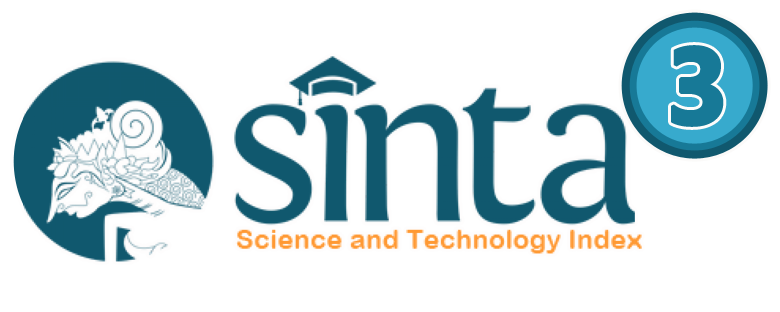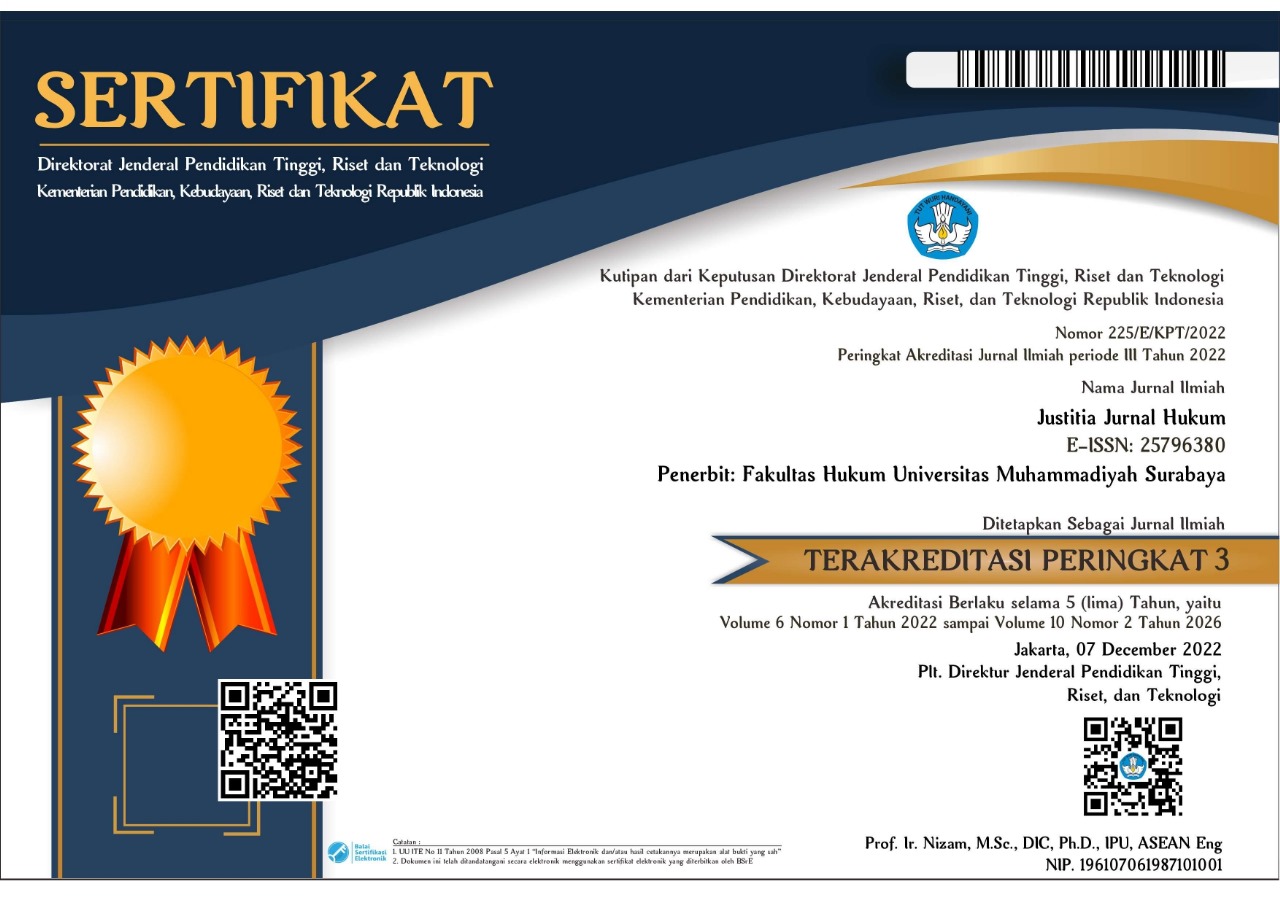Consumer Protection Against Traditional and Dangerous Medicines in Indonesia
DOI:
https://doi.org/10.30651/justitia.v6i2.17240Abstract
Indonesia is a country that has abundant biological wealth. It encourages the rate of production of traditional medicines which is then followed by a high level of community culture towards the consumption of traditional medicines. Traditional medicine is an alternative medicine in addition to generic drugs sold in pharmacies. Many traditional medicines that circulate in the community. It turns out that not a few are included in the category of dangerous drugs. The formulation of the problem in this research is how to protect consumers when problems arise due to dangerous traditional medicines. This research uses normative juridical research methods, while the results show the Food and Drug Supervisory Agency (Badan Pengawas Obat dan Makanan /BPOM) is a agency that has the authority to give permits and has the right to withdraw traditional medicines. The role of BPOM is also to provide recommendations on policies, especially in the regulation of traditional medicines. It turns out that there are rules regarding traditional medicines still overlap between the Government and BPOM in terms of supervision and protection of the community so that there are still many violations. The rules regarding traditional medicine are not yet comprehensive. The task of BPOM supervises production and distribution. The sanctions for violations for traditional medicine producers are in Articles 60 to 63 of the UUPK, namely administrative sanctions, criminal sanctions, and additional criminal sanctions. Meanwhile, dispute resolution can be through litigation, non-litigation, or the Consumer Dispute Settlement Agency.
References
Barakati, M. (2015). PERSPEKTIF KONSEP HUKUM HAK ASASI MANUSIA DALAM MEWUJUDKAN PEMBANGUNAN LINGKUNGAN HIDUP YANG BERKELANJUTAN. Lex et Societatis, III(8), 88–98.
Bolendea, A. I. R. (2019). PERLINDUNGAN KONSUMEN TERHADAP PEREDARAN OBAT TRADISIONAL BERBAHAN KIMIA OBAT MENURUT UNDANG-UNDANG NOMOR 8 TAHUN 1999 TENTANG PERLINDUNGAN KONSUMEN. Lex Privatum, 8(2), 55.
Cahyono, I., Marsitiningsih, & Widodo, S. (2019). Peran Badan Pengawas Obat dan Makanan terhadap Peredaran Obat Tradisional yang Mengandung Bahan Kimia Obat Berbahaya dalam Perlindungan Konsumen. Kosmik Hukum, 19(2), 110–117.
Dhiva, A. A., & Gunarto. (2020). IMPLEMENTASI PERLINDUNGAN KONSUMEN OBAT TRADISIONAL BERBAHAN KIMIA BERBAHAYA DI KOTA SEMARANG. Prosiding KONFERENSI ILMIAH MAHASISWA UNISSULA (KIMU) 3, 8, 310–323.
Hariri, A. (2019). Dekonstruksi Ideologi Pancasila sebagai Bentuk Sistem Hukum di Indonesia. Ajudikasi : Jurnal Ilmu Hukum, 3(1), 1. https://doi.org/10.30656/ajudikasi.v3i1.1055
Hariri, A. (2020). Rekonstruksi Ideologi Pancasila Sebagai Sistem Ekonomi Dalam Perspektif Welfare State. Jurnal Hukum Replik, 7(1), 19. https://doi.org/10.31000/jhr.v7i1.2447
Kristyanti, C. T. S. (2008). Hukum Perlindungan Konsumen (Pertama). Sinar Grafika.
Maufiroh, I. M., & Lukmana, I. (2020). Gender Representation in the Tenth EFL Textbook in Indonesian Senior High School: Systemic Functional Linguistic. Jurnal Penelitian Pendidikan, 20(1), 42–51. https://doi.org/10.17509/jpp.v20i1.24552
Mochklas, M., & Hariri, A. (2019). Pemberdayaan Purna TKW (Tenaga Kerja Wanita) Kecamatan Solokuro, Lamongan. Jurnal Pengabdian Pada Masyarakat, 4(4), 475–482. https://doi.org/10.30653/002.201944.231
Perempuan, K. (n.d.). Perempuan dalam Himpitan Pandemi: Lonjakan Kekerasan Seksual, Kekerasan Siber, Perkawinan Anak, dan Keterbatasan Penanganan di Tengah Covid-19. https://komnasperempuan.go.id/siaran-pers-detail/catahu-2020-komnas-perempuan-lembar-fakta-dan-poin-kunci-5-maret-2021
Shidarta. (2000). Hukum Perlindungan Konsumen Indonesia. Grasindo.
Soekorini, N. (2015). Perlindungan Konsumen Terhadap Produk Pangan yang berbahaya dalam Menghadapi Era Masyarakat Ekonomi Asean. JurnalIlmiah Magister Ilmu Hukum, 1(1), 1–15.
Sonhaji, S. (2020). Perlindungan Pekerja Rumah Tangga Dalam Sistem Hukum Nasional. Administrative Law and Governance Journal, 3(2), 250–259. https://doi.org/10.14710/alj.v3i2.250-259
Sudewi, N. K. A. P. A., Budiartha, I. N. P., & Ujianti, N. M. P. (2020). Perlindungan Hukum Badan Pengawas Obat Dan Makanan (BPOM) Terhadap Peredaran Produk Jamu Yang Mengandung Bahan Kimia Obat Berbahaya. Jurnal Analogi Hukum, 2(2), 246–251. https://doi.org/10.22225/ah.2.2.1928.246-251
Tambuwun, T. T., Paparang, F., & Wahongan, A. S. (2020). Peranan Badan Pengawas Obat Dan Makanan (Bpom) Dalam Perlindungan Konsumen Yang Mengandung Zat Berbahaya. Lex Privatum, 8(4), 96–106.
Wiratraman, H. P., & Putro, W. D. (2019). TANTANGAN METODE PENELITIAN INTERDISIPLINER DALAM Pendidikan Hukum Indonesia. MIMBAR HUKUM, 31, 402–418.
Yunansah, H., & Herlambang, Y. T. (2017). Ecopedagogic Based Education in Raising Ecological Awareness and Developing Character in Elementary School Students. EduHumaniora | Jurnal Pendidikan Dasar Kampus Cibiru, 9(1), 27.
Yusuf, N., & Rohmah, T. (2020). View metadata, citation and similar papers at core.ac.uk. PENGARUH PENGGUNAAN PASTA LABU KUNING (Cucurbita Moschata) UNTUK SUBSTITUSI TEPUNG TERIGU DENGAN PENAMBAHAN TEPUNG ANGKAK DALAM PEMBUATAN MIE KERING, 274–282.
Zuhairi, A. (2016). Hukum Perlindungan Konsumen & Problematikanya (Pertama). GH Publishing.
Downloads
Published
How to Cite
Issue
Section
License











